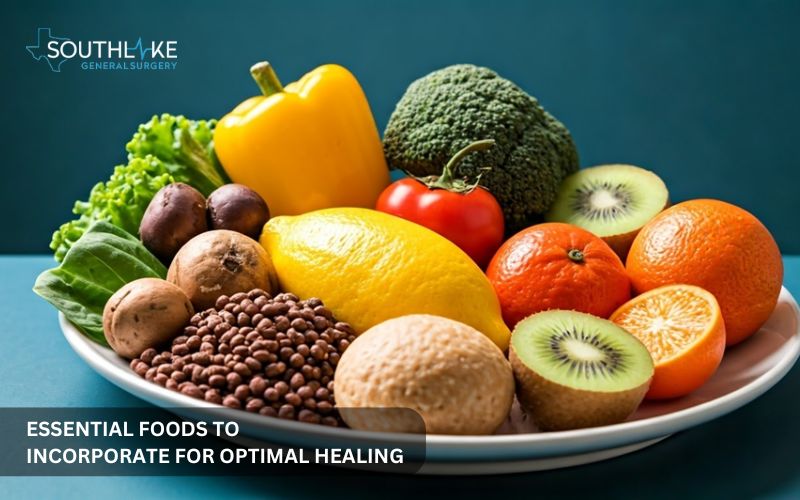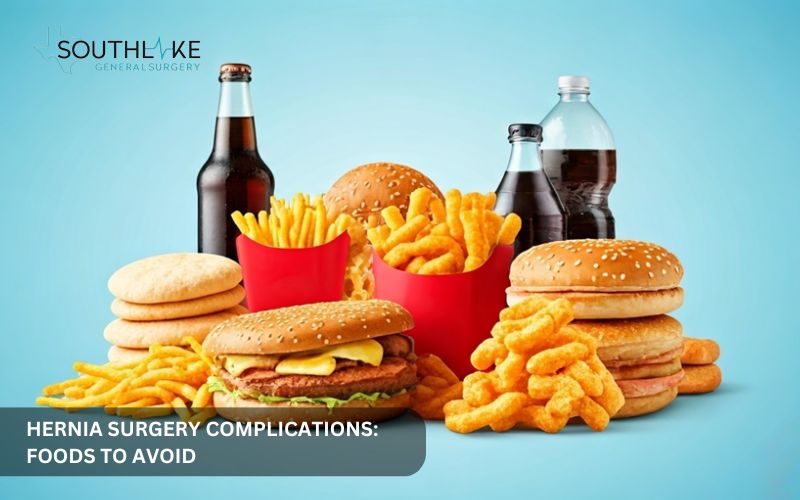Best diet after hernia surgery is crucial for a smooth recovery and to promote healing. It is crucial to start with clear liquids and work your way up to solid foods. Opt for nutrient-dense foods like protein, fiber, vitamins, and antioxidants to aid in the healing process.
Hydration is also vital post-surgery. Avoiding spicy, greasy foods, and carbonated beverages can help prevent digestive discomfort and aid in a successful recovery.
Key Highlights
- After hernia surgery, it’s important to know what to eat for good recovery.
- Your diet will change gradually, starting with clear liquids and then moving to solid foods.
- Focus on foods that have nutrients that help you heal. This means you should eat protein, fiber, and foods that are rich in vitamins and antioxidants.
- Avoid foods that can upset your digestive system, such as spicy foods, greasy foods, and carbonated beverages.
- To maintain proper hydration, consume large quantities of water and other nutritious fluids.
Understanding the Impact of Hernia Surgery on Your Diet
Hernia surgery can be done in two ways: minimally invasive or open. Both methods affect the tissues in your abdominal wall. This has the potential to cause inflammation and stress.
Because of this, your digestive system may feel different. In the first days after the surgery, you may feel that it is more sensitive than normal.
It’s important to follow a special diet now. This diet can help your digestive tract feel better. It should also provide your body with the vitamins and minerals it needs to heal and feel strong.
Choose foods that are easy to digest. Stay hydrated by drinking plenty of water. Avoid orange juice because it can upset your stomach and slow down healing.
Soft Diet After Hernia Surgery
Your digestive system will focus on recovering from the anesthesia in the first twelve to twenty-four hours following hernia surgery. While your body gets rid of the anesthesia, you might feel nauseous or feel like vomiting. This is why it’s important to start with clear liquids.
- Clear liquids are easy to digest.
- They do not cause extra stress on your digestive system.
- You can pick options like water, apple juice, clear broth, and ice chips.
- They help you stay hydrated, especially after fasting before surgery.
Drink these liquids slowly. If you feel better, you can have more. When your appetite returns and the anesthesia is gone from your body, your doctor will tell you when to return to a regular diet.
Navigating Through Your Recovery: Week-by-Week Diet Plan
Following dietary rules after hernia repair surgery are important for getting better quickly. Here are some key points to remember when planning your diet after the surgery:
- First week: Focus on clear liquids like broth and apple juice. This helps your digestive system feel better.
- Second week: Switch to a full liquid diet. Add foods like oatmeal and yogurt to improve nutrition.
- Weeks three and four: Start eating soft and easy-to-digest foods. Scrambled eggs and steamed vegetables are good for the healing process after your hernia repair.
- Fifth and sixth weeks: Gradually return to regular foods, such as lean protein like chicken breast and whole grains. This can assist you in maintaining your energy levels.
Stay hydrated during this time. Drinking enough water might help with digestion and keep you from getting dehydrated. Doing this will facilitate a speedy recovery.
Essential Foods to Incorporate for Optimal Healing

Choosing healthy foods is important for helping your body heal and reducing scars. You should eat a diet that has a lot of protein, fiber, vitamins, and minerals for the best results.
Foods like chicken breast, fish, beans, lentils, and eggs are great sources of lean protein. They help repair and rebuild tissues. These foods provide your body with what it needs to heal the incision and strengthen the muscles close to it.
Protein-Rich Foods for Tissue Repair
Getting enough protein after a hernia surgery is very important. It helps with the healing process. By consuming protein, your body can convert it into amino acids. These amino acids assist in rebuilding your tissues. With enough protein, your body can fix the surgery area, strengthen the abdominal wall, and recover better.
- Good protein sources are lean meats, such as chicken breast, fish, tofu, beans, lentils, eggs, and low-fat dairy.
- It’s a good idea to have a protein source in every meal and snack during the day. This will help you heal well.
- Protein is important for managing the fluid balance in your body. This helps to stop swelling and supports your recovery after hernia surgery.
Hydration and Its Role in Post-Surgery Recovery
Staying hydrated is really important for you after surgery. Drinking enough fluids helps with digestion and getting nutrients. As a bonus, it helps eliminate waste. All these things support healing. Water is the best drink to have. You can also enjoy clear broth, herbal teas, and fruits and vegetables with high water content.
Drink small amounts of fluids several times during the day. This will help you stay hydrated. It can also keep your digestive system from getting too stressed.
Dehydration can cause constipation. This is a common issue after surgery. It’s important to drink plenty of fluids. Make sure to focus on this as a priority in your recovery plan.
Hernia Surgery Complications: Foods to Avoid

Focusing on what you eat is very important for recovery. It is also vital to know what foods to avoid after hernia surgery. Some foods and drinks can upset your digestive tract. This can lead to discomfort, gas, bloating, or even serious issues.
By staying away from high-fat foods, spicy foods, and foods that can cause gas, you can recover better. Eating less of these foods reduces the pressure on your digestive system while it heals. As a result, you’ll have an easier and more effective recuperation.
Identifying Foods That Can Disrupt Digestive Health
Your digestive tract may feel upset soon after surgery. Foods that you once ate without problems could now lead to issues like indigestion, heartburn, or bloating.
Eating spicy foods can upset your digestive tract. It may irritate the area where you had surgery. High-fat and greasy foods can slow down your digestion. It’s best to avoid these foods, particularly in the first few weeks after your surgery.
You should eat simple foods that are not spicy. These foods are easy to digest. They supply essential nutrients to your body. Plus, they don’t make your digestive system work too hard.
Managing Expectations: Foods That May Lead to Discomfort
Feeling stomach pain after surgery is normal. You need to know about common issues like GERD, constipation, nausea, and gas. If you have GERD, you should cut down on or avoid coffee, citrus fruits, and tomato-based foods. Constipation often occurs after surgery and when taking some pain medicines. You can feel better with constipation by:
- Drink enough water.
- Maintain a diet rich in fiber by eating lots of fruits, vegetables, and whole grains.
- Include gentle exercise in your daily routine, as your doctor says.
If you feel sick to your stomach, eating plain foods might help. Try to avoid strong smells or flavors because they could make you feel worse.
Conclusion
Following the dietary guidelines after hernia surgery is very important for recovery. Eating balanced meals that are high in protein is key. It’s also important to drink enough fluids. You need to stay away from meals, that can make things worse. Always listen to your body and adjust your meals if needed. Eating small meals and staying hydrated will aid your healing process.
Eating whole grains, lean proteins like chicken breast, and fiber-rich fruits and vegetables can help your digestive system work better and heal. Be cautious with triggers like spicy foods and caffeine, as they can cause discomfort.
Talking to experts at Arizona Premier Surgery can help you find a healthy diet that works for you. Eating moderately and staying hydrated are primary concerns. Good nutrition can help you feel better as you recover.
Make an Appointment
To help you heal after hernia surgery, diet is very important. You should speak with Dr. Valeria Simone, MD, at Southlake General Surgery in Texas. You can schedule an appointment by calling +1 (817) 748-0200.
Dr. Simone will give you helpful advice tailored to your needs. She will discuss essential topics like nutrition, the healing process, and the digestive system.
This information will assist you in making better food choices during your recovery. Eating well can help your abdominal wall heal and improve your overall health.
Frequently Asked Questions
How Soon After Hernia Surgery Can I Start Solid Foods?
Your surgeon will probably tell you to begin with clear liquids. As your digestive system gets better, you can slowly add solid foods. After a few days, you should be able to eat soft foods that are easy to digest. Eventually, you can go back to a more normal diet when you feel ready.
What foods are good after surgery?
Eating foods that are easier to digest is crucial after hernia surgery. You should include lean proteins, fruits, vegetables, and whole grains in your diet. Drink plenty of water, too. Try to avoid spicy foods, carbonated drinks, and heavy or greasy meals. These foods can upset your digestive system. A balanced diet will help you recover better.
What are some recommended foods to promote healing after hernia surgery?
Recommended foods after hernia surgery include lean proteins like chicken and fish, fiber-rich fruits and vegetables, whole grains, and probiotic-rich foods like yogurt. These choices can aid in healing, reduce inflammation, prevent constipation, and support overall recovery after surgery.
Medically Reviewed By: Dr. Valeria Simone MD
Board-certified General Surgeon at Southlake General Surgery, Texas, USA.
Follow us on Facebook and YouTube.
References:
- Kim, H. O., Kang, M., Lee, S. R., Jung, K. U., Kim, H., & Chun, H. (2018). Patient-Controlled Nutrition After Abdominal Surgery: Novel Concept Contrary to Surgical Dogma. Annals of Coloproctology, 34(5), 253–258. https://doi.org/10.3393/ac.2018.05.29
- Hirsch KR, Wolfe RR, Ferrando AA. Pre- and Post-Surgical Nutrition for Preservation of Muscle Mass, Strength, and Functionality Following Orthopedic Surgery. Nutrients. 2021 May 15;13(5):1675. doi: 10.3390/nu13051675. PMID: 34063333; PMCID: PMC8156786.
- Smith-Ryan AE, Hirsch KR, Saylor HE, Gould LM, Blue MNM. Nutritional Considerations and Strategies to Facilitate Injury Recovery and Rehabilitation. J Athl Train. 2020 Sep 1;55(9):918-930. doi: 10.4085/1062-6050-550-19. PMID: 32991705; PMCID: PMC7534941.
- Hammoud, M., & Gerken, J. (2023, August 8). Inguinal Hernia. StatPearls – NCBI Bookshelf. https://www.ncbi.nlm.nih.gov/books/NBK513332/
- Ma, X., Nan, F., Liang, H., Shu, P., Fan, X., Song, X., Hou, Y., & Zhang, D. (2022). Excessive intake of sugar: An accomplice of inflammation. Frontiers in Immunology, 13. https://doi.org/10.3389/fimmu.2022.988481

